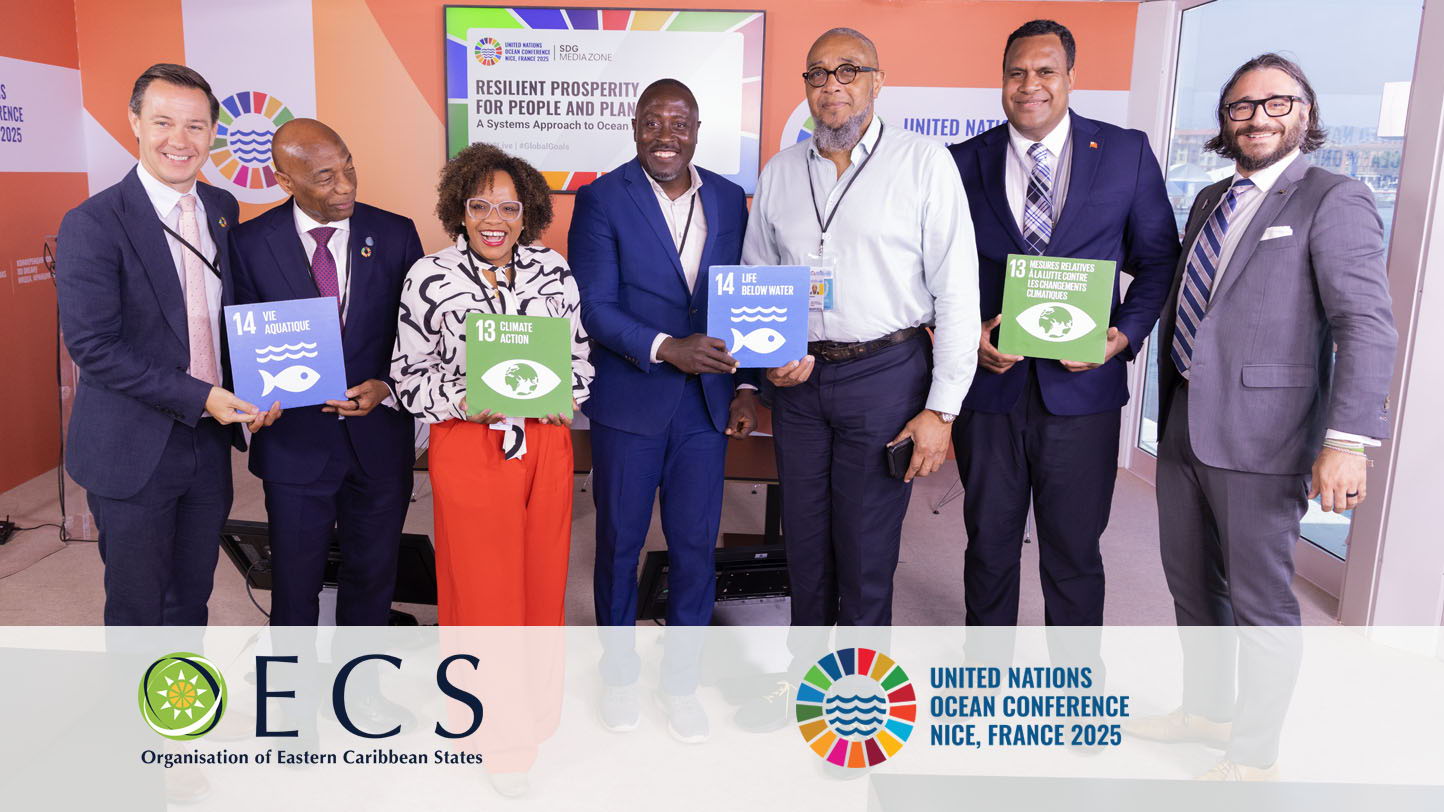The OECS at UNOC3: Caribbean Leadership in Action for a Healthy Ocean
OECS Media Release
At the Third United Nations Ocean Conference (UNOC3) in Nice, France (June 9–14), the Organisation of Eastern Caribbean States (OECS) demonstrated strong regional leadership and innovation on ocean sustainability. With the ocean playing a central role in the region’s economy, culture, and climate resilience, the OECS Commission actively engaged in high-level dialogues, technical sessions, and multi-stakeholder forums aimed at advancing marine conservation and sustainable blue economies.
A key milestone was achieved with the launch of Actioning Blue: Caribbean 30x30 Vision for the Ocean. Fourteen Caribbean nations, including OECS Member States, pledged to protect 30% of the region’s marine areas by 2030. The launch took place on the Art Explorer vessel, co-hosted with Grenada, the Caribbean Biodiversity Fund, the Ocean Coordination Mechanism, and other key partners.
Further highlighting the 30x30 Vision for the Ocean, the OECS contributed to the session, “Uniting Regional Governance for a Resilient Ocean Future 30x30,” co-organised by the Caribbean Biodiversity Fund (CBF), the Wildlife Conservation Society (WCS), and the Ministry of Science, Technology and Environment of the Republic of Cuba. Representing the OECS on the panel, Dr. Helena Jeffery Brown, Programme Director of the Biodiversity, Ecosystems and Ecosystem Services Unit, spoke about the unique vulnerability of Caribbean Small Island Developing States (SIDS) and underscored the critical need for a precise coordination mechanism to support OECS Member States as they work to reverse biodiversity loss and meet the targets of the Kunming-Montreal Global Biodiversity Framework (KMGBF).
The OECS also played a leading role in addressing the region’s sargassum crisis through science and cooperation. In partnership with Guadeloupe, Expertise France, GeoBlue Planet, the United Nations Environment Programme, UNEP, and several universities, the OECS co-hosted two major side events. The first, Turning the Tide: Advancing Science, Solutions, and Cooperation on the Tropical Atlantic Sargassum Crisis, highlighted the ecological and economic impacts of sargassum and proposed coordinated international responses. This session was addressed by H.E. Colin Murdoch, Permanent Observer of the OECS to the UN Office in Geneva, and Dr. Sylvie Gustave Dit Duflo, Vice President of the Guadeloupe Regional Council, underscoring high-level political engagement in the effort. The second event, Understanding Coastal Impact and Strengthening Cooperation through Local Responses, focused on community-driven strategies to build resilience and was addressed by Josette Edward-Charlemagne, OECS Programme Officer in the Climate Change and Disaster Risk Management Unit.
A milestone achievement in addressing the sargassum crisis was the adoption of the International Action Plan for the Management of Sargassum Floods, which received notable endorsement from France, Costa Rica, Mexico, the Dominican Republic, the OECS Commission, and OECS Member States.
Education and innovation were front and center, too. At the #ForCoral Pavilion, the OECS showcased a Virtual Reality (VR) experience and the Ocean Explorer board game, both designed to enhance ocean literacy of all ages across the Eastern Caribbean to better understand the ocean and the importance of conserving this natural resource.
Further contributing to global discussions on ocean governance, the OECS participated in the "Blueprints for the Future" side event, which spotlighted marine spatial planning, financing, and data-driven decision-making. Susanna DeBeauville-Scott, Programme Director for the OECS Sustainable Ocean Management Programme, highlighted the region’s progress in developing Marine Spatial Plans through the World Bank-funded Caribbean Regional Oceanscape Project (CROP), underscoring the OECS’ role as a leader in sustainable marine planning.
On the topic of ocean finance, Mr. Chamberlain Emmanuel, Head of the OECS Environmental Sustainability Division, joined a high-level panel in the UNOC3 Media Zone to discuss “Resilient Prosperity for People and Planet – A Systems Approach to Ocean Finance.” The Commission also participated in a side event focused on mobilising private finance for marine ecosystems, where Ambassador Colin Murdoch joined global experts in advocating for innovative and inclusive financial solutions.
The OECS continued to build strategic partnerships during bilateral meetings with Expertise France and the French National Research Institute for Sustainable Development (IRD) to advance the SARSEA Project. This collaborative initiative, funded by Agence Française de Développement (AFD), will bring together scientists and technical experts from the Caribbean and France to tackle the sargassum influx through cutting-edge research and coordinated action.
Throughout UNOC3, the OECS consistently promoted inclusive, science-based, and locally informed approaches to ocean sustainability. From launching political declarations and advancing marine spatial planning to showcasing educational tools and forging new partnerships, the Commission reaffirmed its role as a catalyst for ocean action within Small Island Developing States (SIDS).
As the global community continues its work toward achieving the 2030 Agenda, the OECS calls for strengthened support, collaborative investment, and global solidarity to ensure a resilient, prosperous, and sustainable ocean future for all.
Danny Moonie
OECS Communications Unit



















